DUBLIN (Reuters) – Ireland may vote its coalition government out of office in an election on Friday without backing any clear alternative, threatening a political impasse as it emerges from the euro zone debt crisis.
Cast as a choice on how to distribute the profits of a strong economic recovery since accepting a 2010 sovereign bailout, the election could force the country’s two biggest parties to consider an uneasy and potentially unstable alliance.
The outcome will hinge on the extent to which Prime Minister Enda Kenny’s pledge to “keep the recovery going”, which opinion polls suggest has failed to inspire the electorate, sways undecided voters on polling day.
“It would be nice for someone to present their vision, you know a passionate vision,” said Lorna Wallis, a voter in Dublin who said she would be backing independent candidates.
Polls suggest current junior coalition partner Labour’s support has collapsed, while Kenny’s Fine Gael have let a wide lead slip. Their combined support has dipped to 33 to 37 percent in polls.
That compares with the 41 to 42 percent finance minister Michael Noonan believes they need to form a government, likely with the help of independent candidates or smaller parties.
Exit polls published early on Saturday will give the first indication of whether Kenny’s party and Labour have done enough to hold on to power.
If there is no late shift in voter intentions, one way to break any deadlock could be an unprecedented alliance between Fine Gael and its centre-right rivals Fianna Fail. But these heirs to opposing sides in a civil war almost a century ago have so far shown no appetite to team up this time around.
Vote counting begins on Saturday, with the first of 157 seats declared in the early afternoon and the final winners potentially not decided until early next week.
That may mark the beginning not the end, however, of uncertainty over the likely shape of the government.
A hung parliament would echo the recent election experiences of Portugal and Spain, where anger at austerity, perceptions of rising social inequality and mistrust of established political elites led to indecisive outcomes.
“I think that the traditional parties will survive a little better than they have done in those countries, but as in those countries after the election … I think we will see uncertainty here,” said Michael Marsh, a professor of politics at Trinity College Dublin.
An unstable government could slow Ireland’s response to a possible “Out” vote in an EU membership referendum in neighbour and major trade partner Britain on June 23.
Uncertainty about the election and Britain’s referendum pushed the gap between Irish and French bond yields to its widest in eight months on Tuesday, although Ireland is still able to borrow at near record-low costs.
(Additional reporting by Georgina Cooper; Editing by Hugh Lawson)

COMMENTS
Please let us know if you're having issues with commenting.